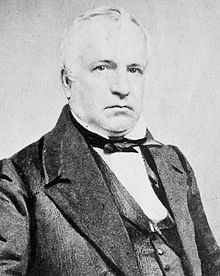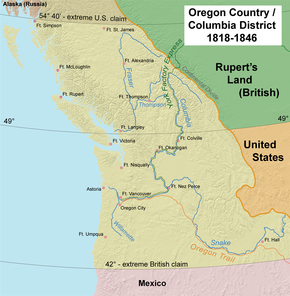WAR OF 1812 TO PAN AMERICAN WAR (1815-1846):
Canada:
By 1840, it was clear that the rushed union did not work. English Canadians did not like the idea of French Canadians being equal in power despite being the overall minority in the Union (known as the Union of British North America). Those in the Atlantic feared being ignored, and so a unitary government became impractical and unworkable for all involved. Roughly coinciding with the discovery of gold in the Fraser Valley of the Columbia District/Oregon Country [1], the Union put pressure on Britain to allow them to reform it and Britain, wary of American expansion and disunited colonies amidst a very real fear of another war with the USA, was eager to listen. It also helped that Baldwin and Lafontaine were around to help try and find cooperation and compromise.
A statue dedicated to Baldwin and Lafontaine
In the chaos of the union, two leaders emerged who were dedicated toward moving forward as a nation. They had a vision of a free and fair Canada, no matter their language or religion. These two were Robert Baldwin, and Louis-Hippolyte Lafontaine. Somehow, beset by Orange Order violence, French-Canadian grievances, and a very real potential for war with their southern neighbour, these two began to forge a nation from these various colonies.
Their end result is the replacement of the Union of British North America with the Commonwealth of Canada in 1842, which was a relatively loose union with many protections and guarantees for minorities, be they linguistic or religious. It also maintained a promise for greater representation for the smaller provinces, and would also enable greater funding for projects such as railroads. Louis-Hippolyte Lafontaine became the first Prime Minister of the Commonwealth of Canada [2].
Louis-Hippolyte Lafontaine, founding father and first prime minister of Canada
United States of America:
America, seeing a sudden and rapid settlement of Canada's west, sparks fears that the British will attempt to control the entirety of the Oregon Country for themselves and keep America away from the Pacific. Seeing relatively amicable Anglo-Mexican relations, America fears encirclement by Britain and British allies, and so once again prepares for the prospect of war. It is a tense time in North America.
America's more aggressive stance on the Oregon Country sours relations with the British by the 1840's. The gold rush has a lot to do with it. The refrain of "54'40 or fight!" is rather popular in the States, and politicians heed its call. The Texas issue is still a problem, but now America hopes that it can be resolved after yet another war with Britain. With a sharper American insistence on total ownership of the Oregon Country in 1846, talks break down, conflict breaks out in the Rockies, and the US and Britain find themselves at war for the second time in 34 years. Little did the British know that this would spiral into a conflict that would eventually be known as the Pan American War.
The Netherlands:
Meanwhile in Europe, the Belgian Revolution has not gone terribly well for the Belgians. Orangism has succeeded in keeping the bulk of Flanders and Limburg a part of the United Kingdom of the Netherlands [3]. Belgium is completely landlocked, and largely a Wallonian nation with a modest Flemish minority. Amidst British fears of outright annexation by France, Belgium is assured its neutrality.
Thanks to the earlier work of Daendels to get the Dutch Gold Coast colony working in the 1820s, and maintaining important population centres in the wake of the Belgian revolution, the Dutch have seen something of a modest resurgence in their colonial empire. The Gold Coast became a condominium between them and the British, with each nation retaining their ports and sharing joint custody and influence over the inland Ashanti Kingdom [4]. This in turn helped with the success of the modest Dutch Sint Thomas colony on the eastern coast of Guatemala.
Herman Willem Daendels, Governor-General of the Dutch East Indies
In the 1840s, the Dutch begin to settle Santo Tomas after they had supported Rafael Carrera in his drive for the independence of Guatemala. The territory was authorized in 1843 "in perpetuity" by the Guatemalan parliament to be administered by the Netherlands. While small, it proved modestly successful thanks to the Javanese workers and settlers brought to the area, as well as the presence of Dutch Africans and mulattos [5].
The Dutch Saint Thomas Colony
South America:
In 1821, Simon Bolivar is unable to convince San Martin and the local elites that Guayaquil and Quito should be attached to the north as opposed to returning to Peruvian jurisdiction [6]. As a result, the "Free Province of Guayaquil" is functionally independent as no consensus can be reached. Olmedo, the provisional leader of Guayaquil, is wary of the fact that they may be fought over by Peru and Gran Colombia. As a result, he attempts to secure the independence of Guayaquil by diplomacy with Gran Colombia and Peru. Additionally, he secretly contacts the British in the hopes of establishing a protectorate over Guayaquil. When it becomes clear that Peru and Gran Colombia will fight over Guayaquil with no concern for the Guayaquileños, Olmedo offers to make the Free Province of Guayaquil a British protectorate.
José Joaquín de Olmedo y Maruri, President of Guayaquil
Britain is initially hesitant, but sees the advantage of having a large part and potentially stabilizing force on the Pacific coast of South America, as well as being able to enforce greater influence and pressure on Latin American countries. They would also be able to check European ambitions in the Pacific. The Free Province of Guayaquil is established as a British protectorate with Olmedo as its first President.
America reacts poorly to this development, as they see it as a blatant violation of the nascent Monroe Doctrine [7]. Several South American nations also fear that a similar fate - or even divide and conquer tactics - might be used by European powers to reassert control and influence (ignoring that the new nations would be entirely dependent on European influence). The result is an America that still feels that Britain doesn't take it seriously, and several Latin American nations fearing European expansion. The stage is set for what would become the Pan American War.
Britain and France's blockading of Buenos Aires (and by extension, the rest of the Argentine Confederation) forces the Argentine Confederation to seriously consider the offer and proposal of American diplomats to "join them in a fight against European Imperialism". The Argentines desire to recreate the United Provinces of the Rio de la Plata, but British and Brazilian interests stand in the way.
Venezuela, having a border dispute with regards to Guyana and the Essequibo River, are also enticed to join in this "Anti-Imperial Alliance". Guatemala, Nicaragua, and Ecuador are far more skeptical and take much more convincing. Guatemala's leaders are eventually convinced by the promise of American recognition of their claims, as well as American help and diplomatic pressure if Mexico attempts anything. Ecuador is convinced when Colombia, while officially neutral, promises to help provide arms, funds, and some discreet volunteers towards Venezuelan and Ecuadorian efforts to reclaim "stolen" territory. Nicaragua is the hardest to convince as they are keenly aware of their limitations and are afraid of British reprisal. They hope instead to win control of the Mosquito Coast through diplomatic pressure, and so eventually decide against joining the cause.
The stage is set. The Pan American War is about to begin.
----------
[1] Gold was discovered here after the settling of the dispute in OTL. Instead, it happens earlier ITTL thus sparking a war.
[2] In OTL, Baldwin and Lafontaine were the fathers of responsible government. In this TL, they are among the fathers of Confederation.
[3] The Belgian Revolution goes better for the Dutch, and the Dutch king listens to his sensible son. Belgium still exists, though it is smaller and has no major direct ocean access.
[4] In OTL, Daendels died just two years into his term. ITTL he survives and makes a decent success of the colony, thus causing complications with the British. With the Brits eventually unable and unwilling to go to war or offer a buyout, a condominium like Sudan or the New Hebrides becomes the amenable solution to both.
[5] Since there's no Belgian colonies in this TL now, it's the Dutch who take advantage of the Santo Tomas opportunity and make a modest success of it thanks to their existing colonial empire.
[6] In OTL, Bolivar convinces them which also results in Guayaquil joining Ecuador.
[7] The Monroe Doctrine still happened, and America takes it seriously. However, the acquisition of British Guayaquil, Dutch Saint Thomas, Venezuela dispute, and European blockading of Argentina causes America to approach adjacent nations in the hope of building a League of American Nations that will help each other and the hemisphere resist European ambitions.









